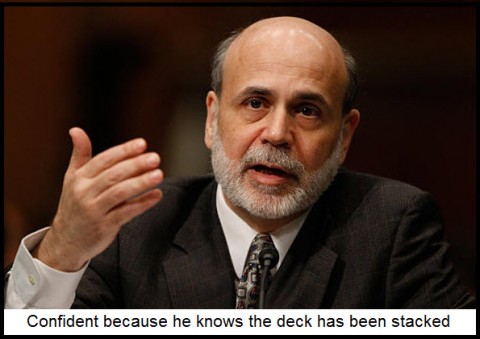Rep. Ron Paul’s bill to subject the Fed to broad audits sailed through the U.S. House of Representatives yesterday; now it goes to the Senate, where it is certain to die. Those who believe that Democrats and Republics are fundamentally indistinguishable should ponder the bill’s fate when November rolls around. While it’s true that Paul’s Federal Reserve Transparency Act drew bipartisan support in the House, garnering the votes of more than three dozen Democrats, Senate Democrats can be expected to take a harder line. If and when they kill the measure, it will probably be the last time for a very long while that anyone in Congress seriously challenges the Fed’s right to withhold the truth and to answer to no one but its lords and master on Wall Street.
For his part, Helicopter Ben Bernanke seems so confident that the Senate will uphold the status quo that he did not even speak out against HR 1207. Appearing before a House panel last week, he was Mr. Cool, sounding like he’d been scripted by Goebbels himself: “We are quite transparent and accountable on monetary policy,” the Fed chairman testified. “Besides our statement, besides our testimonies, we issue minutes after three weeks. We have quarterly projections, I give a press conference four times a year, there’s quite a bit of information provided to help Congress evaluate monetary policy as well as the public.”
Pure Bull
Yeah, sure: “Quite a bit of information.” All of it pure bull. Friends of the Fed have argued that airing the full details of, for one, the banking bailout would damage the financial position of the firms involved and destabilize the economy. True enough. But if you pile their lies and secrets high enough, the whole, rotten system is eventually going to collapse anyway. “An audit would expose the Fed as a massive fraud perpetrated on this country, enriching a privileged few bankers at the top of our economic food chain, and leaving the rest of us with massively devalued dollars which we are forced to use by law,” wrote Paul recently, not mincing words, at LewRockwell.com. It is both a shame and a tragedy that Ron Paul’s presidential bid, with enormous grass-roots support, was never taken seriously by the new media or the power brokers. Does anyone outside of those precincts even dispute that the Fed was created, not to stabilize the money system, but to give banks all but unlimited power to create their own money from thin air?
***
Trading stocks, options and commodities in these treacherous times calls for great patience and skill. Click here if you’d like to see how Rick’s Picks approaches the challenge.


All the silly acceptance of green martians invading America is what we have here. The Colorado incident was ripe for speculation that he wasn’t the gunman. Conspiray. Th 4th year of a market that has gone up on average 25 percent per year is also based on conspiracies and manipulation. It is only when it hits the devilish 666 on the SP500 that everyone here is vindicated that the markets are acting rationally.
Markets thoughout history have overshot on both sides. It is afterall a guessing game based on earning trends and special events. To suggest “this time is different”, begs the question why use any historic patterns at all? If you can’t understand the markets because of the “new manipulation rules” than it is best to sit on cash. Rick suggests massive manipulation but he has found a technical system that works for him. How is that possible? Manipulation and technicals are clearly opposites.
I have a technical system that is based on fibonacci numbers and the idea of a contracting spiral. This system predicted years ago that the next market low would be near the end of 2014, than 2017, 2019 finishing in a singularity at 2020. It might turn out to be another failed system. It doesn’t base it on preconcieved notions, only observable extrapolation. Unemotional data and hypothesis I can accept. “this time is different” based on manipulation and conspiracies I can’t. While these things do occur, to suggest we have mastered it to manipulate the world begs the question why expect it to eventually fail? Either they have complete control or they don’t. To suggest their control has held for 4 years but will eventually fail also suggests it is a guessing game when they do fail. I can’t play the markets on that premise.